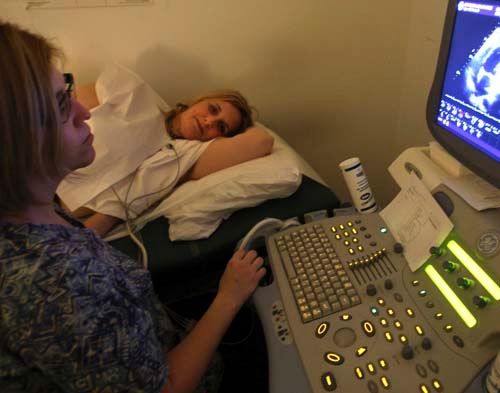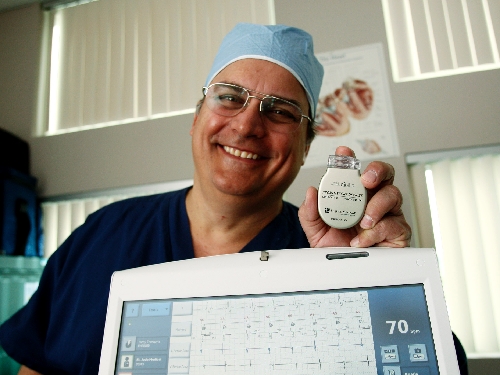Heart patient’s weekly radio show to focus on women’s health issues
At 7:30 a.m. Wednesday, Billie-Marie Morrison is confident as she sits in her cluttered law office, saying it's just a matter of time before one of her clients receives justice in his lawsuit against drug manufacturers and Dr. Dipak Desai, whose clinics are at the center of a massive hepatitis C outbreak that first caught regulators' attention in 2008.
At 4:30 p.m. Thursday, Morrison, 43, is worried as she lies on a table in the office of her cardiologist, Dr. Ram Singh. Her brow wrinkled as she wondered aloud whether the device now embedded in her chest will keep her from needing a heart transplant.
"Is it working right?" she asked Kimberly Grana, who was administering an echocardiogram, which at that moment was assessing the pumping function of Morrison's heart.
Less than a year ago, before the surgical implantation of the mechanism now regulating her heart, the organ's pumping power, known as ejection fraction, was measured at only 10 percent (55 to 65 percent is considered normal).
If the implanted device fails, a transplant would be her only hope.
"It's over 50 percent," Grana said. "Looking good."
"I've been feeling great," Morrison said. "I really have. But it's good to know this for sure."
As Morrison lay in the darkened room and Grana measured the size of the chambers of her heart, the attorney who works with Craig P. Kenny & Associates said she has received a second chance at life and intends to use it to help others.
"I've been involved in medical cases most of my career, either in medical malpractice or workman's comp. But until this, I didn't realize the depth of the frustration and hurt of my clients. Now I plan to help women, all people really, navigate our health system."
To that end, Morrison recently became a WomenHeart Champion after graduating from a symposium at the prestigious Mayo Clinic in Minnesota.
She is one of 65 women -- all heart disease survivors -- selected from a nationally competitive application process. Their mission is to return from the symposium to educate and advocate on the issue of women and heart disease, the leading cause of death for women in the United States.
One of the first steps Morrison's taking is to host and bankroll, with the help of a friend, an hourlong, weekly radio show called "Double Take," aimed largely at women's health issues. The show, which will run Fridays 4 p.m. to 5 p.m. on KLAV-AM, 1230, debuts on March 5.
The "Double Take" name for the show, Morrison said, comes from the fact that things often aren't what they first seem to be. She said she'll work into the show her own story.
"I only went to the doctor in late 2008 because some friends wanted me to go," she said. "I thought I just had a bad cold."
When she first went to an urgent care, doctors said she might have a slight case of pneumonia that was aggravated by her asthma. Though they took X-rays, they didn't read them until a week later. They gave her antibiotics.
"I told them that I had to sleep sitting up in a chair, it was the only way I could get my breath," Morrison said. Her ankles were also swollen and she had put on almost 20 pounds in just a few weeks.
"They missed the shortness of breath and fluid retention that is an indication of congestive heart failure," Singh said as he looked Thursday at copies of Morrison's echocardiogram results.
Despite the antibiotics, Morrison continued to feel bad and went back to the urgent care a second time. This time the doctor diagnosed her with bronchitis and gave her another prescription.
It wasn't until the third time that she visited the urgent care over a week's period that a doctor showed her a radiologist's interpretation of her X-rays, telling her she had a potentially serious heart problem. You should see a cardiologist, he said.
"In retrospect, I should have demanded the results of my X-rays right away," Morrison said. When she got the results, she said she broke down in tears.
"He said I may need a heart transplant to stay alive," she recalled. "He tried to explain my heart disease to me, but I didn't hear very much of what he said. He kept saying I was lucky to be alive."
Because her heart was barely pumping, Singh said she had to go to Sunrise Hospital right away.
She was first diagnosed with dilated cardiomyopathy, a disease of the heart muscle that makes it difficult to pump blood and deliver it to the rest of the body.
While at Sunrise, a team of doctors said they thought it best that she have immediate surgery. Morrison said she spoke up this time. "I had very little understanding of what was wrong with me."
After consulting with a number of doctors and surgeons, both in and out of town, she decided not to undergo surgery until she saw whether a regimen of medications could control her heart problems.
It wasn't easy going.
There were times when she would pass out at home: "I'd end up on the floor and not know what happened."
After those blackouts, doctors outfitted her with what is known as a LifeVest, an external defibrillator worn by a patient at risk for sudden cardiac arrest. It monitors the patient's heart continuously, and if the patient goes into a life-threatening arrhythmia, the LifeVest delivers a shock treatment to restore the patient's heart to normal rhythm.
After wearing the vest for a month, she decided to have surgery in June.
Her heart problems, doctors said, required a new pacemaker-defibrillator, a battery operated internal device about the size of a round pager that paces both sides of the lower chambers of the heart, the right and left ventricles. It continually monitors the heartbeats to make sure they are normal.
It delivers a shock to the heart only when it senses a life-threatening rhythm.
"I really doubt that (the shock) is going to happen to her because she is doing so well," Singh said.
This type of therapy is useful for patients such as Morrison, where there is uncoordinated activation of the heart muscle and the pumping function of the heart muscle is not synchronized.
Dr. David Navratil implanted the device in Morrison underneath her left collarbone. Electrodes were inserted through veins into both ventricles and on one atrium.
"It only took about 45 minutes," he said. "No problems at all."
Singh says that if Morrison keeps "making the progress she is now" she can live a long life.
"Many of my colleagues and friends were surprised I relied on medical professionals in Las Vegas," Morrison said. "They know that I've sued an awful lot of them for malpractice. But there are good doctors here, just like anywhere. You just have to ask the right questions and do a little investigation. You don't want to go out of state for your aftercare for the rest of your life unless you absolutely have to."
Contact reporter Paul Harasim at pharasim@reviewjournal.com or 702-387-2908.


















